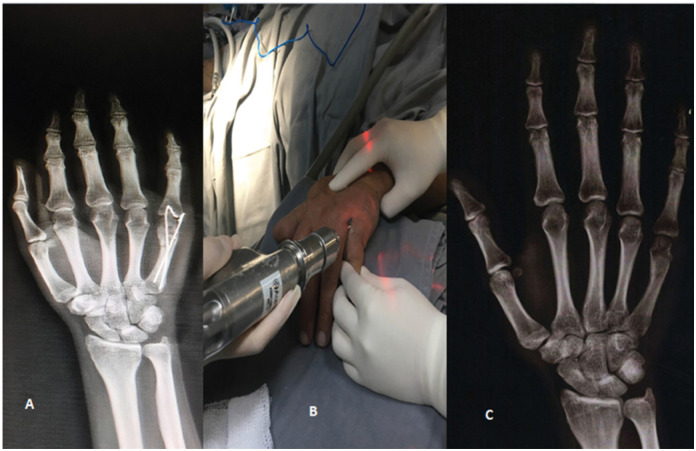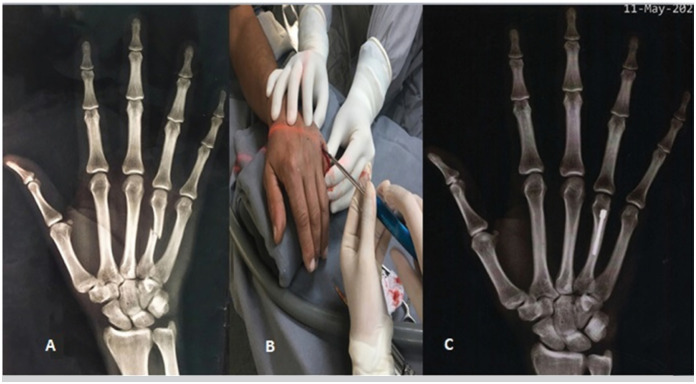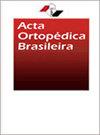METACARPAL FRACTURES TREATMENT: COMPARASION BETWEEN KIRSCHNER WIRE AND INTRAMEDULLARY SCREW.
IF 0.5
4区 医学
Q4 ORTHOPEDICS
引用次数: 0
Abstract
ABSTRACT Introduction: Metacarpal fractures are common and can be treated surgically using Kirschner wires (K-wires) or intramedullary fixation with compression screws (IMCS). Objectives: Analyze the postsurgical results from treating the metacarpal extra-articular fractures through the retrograde Kirschner wire technique, and compare it with the intramedullary compression screw fixation. Methods: Retrospective and quantitative studies were to analyze patients’ medical records, and a postsurgical evaluation questionnaire was given to the patients, who were divided into K-wire and IMCS. Results: The period of immobilization with a splint took six weeks for the K-wire group and four weeks for the IMCS group. The average time for consolidation took, respectively, fifty-seven days and forty-seven days. The first group could restart their activities twenty-two days after the other, and the average force value of the treated hand, when compared with its contralateral, was 93.9% and 95.4%, respectively. Between the operated hand and its contralateral, there was a difference of 16° in the total measures of the metacarpophalangeal and interphalangeal joint's range of movement among the K-wire group and 5° among the IMCS group. Conclusion: The patients who participated in this study showed excellent results after surgery, and both treatments were proven to be safe and reliable. Evidence level III; Retrospective comparative study .


掌骨骨折的治疗:克氏针与髓内螺钉的比较。
导言:掌骨骨折是常见的,可以手术治疗,使用克氏针(k -钢丝)或髓内固定加压螺钉(IMCS)。目的:分析逆行克氏针技术治疗掌骨关节外骨折的术后效果,并与髓内加压螺钉固定进行比较。方法:回顾性和定量分析患者的医疗记录,并对患者进行术后评价问卷,将患者分为k -钢丝组和IMCS组。结果:k -钢丝组固定时间为6周,IMCS组固定时间为4周。整理的平均时间分别为57天和47天。第一组可以在另一组22天后重新开始活动,与对侧手相比,治疗手的平均力值分别为93.9%和95.4%。在手术手和对侧手之间,k -钢丝组的掌指关节和指间关节活动范围的总测量值差异为16°,IMCS组的差异为5°。结论:参与本研究的患者术后效果良好,两种治疗方法均安全可靠。证据等级III;回顾性比较研究。
本文章由计算机程序翻译,如有差异,请以英文原文为准。
求助全文
约1分钟内获得全文
求助全文
来源期刊

Acta Ortopedica Brasileira
Orthopedics-
CiteScore
0.90
自引率
14.30%
发文量
67
审稿时长
25 weeks
期刊介绍:
A Revista Acta Ortopédica Brasileira, órgão oficial do Departamento de Ortopedia e Traumatologia da Faculdade de Medicina da Universidade de São Paulo (DOT/FMUSP), é publicada bimestralmente em seis edições ao ano (jan/fev, mar/abr, maio/jun, jul/ago, set/out e nov/dez) com versão em inglês disponível nos principais indexadores nacionais e internacionais e instituições de ensino do Brasil. Sendo hoje reconhecidamente uma importante contribuição para os especialistas da área com sua seriedade e árduo trabalho para as indexações já conquistadas.
 求助内容:
求助内容: 应助结果提醒方式:
应助结果提醒方式:


